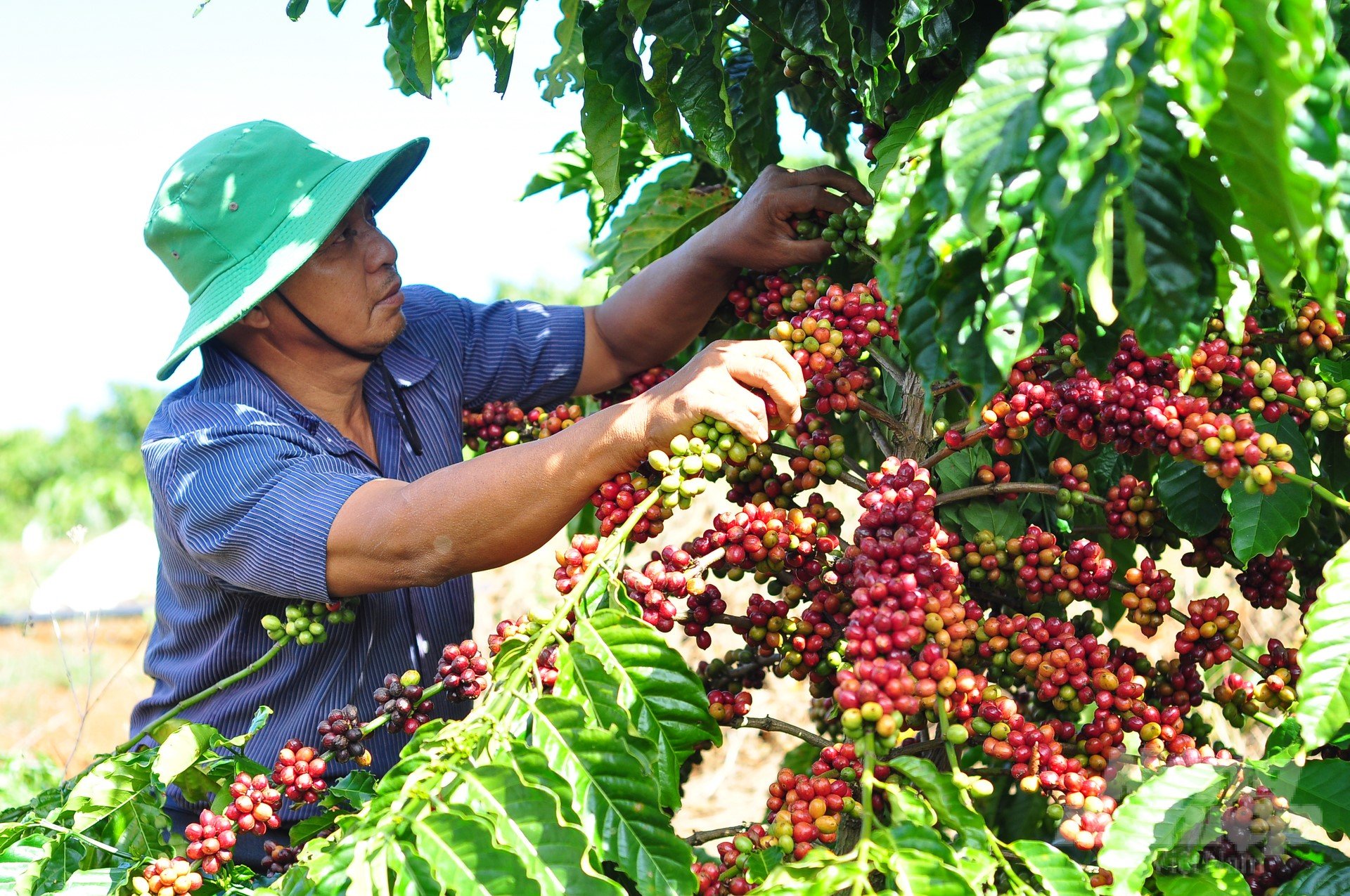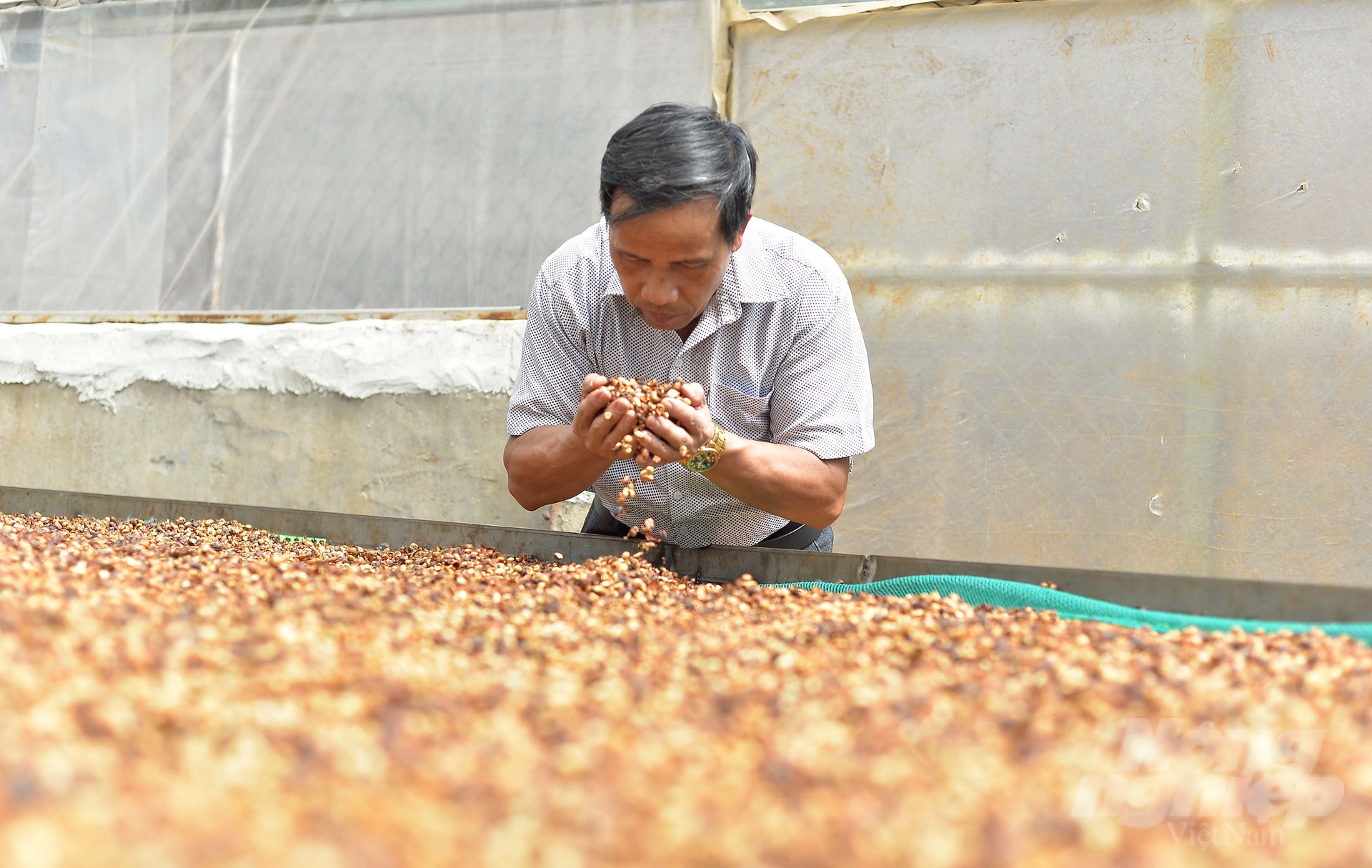June 16, 2025 | 12:20 GMT +7
June 16, 2025 | 12:20 GMT +7
Hotline: 0913.378.918
June 16, 2025 | 12:20 GMT +7
Hotline: 0913.378.918

Lam Dong currently has about 176,000 ha of coffee, of which Robusta coffee accounts for over 160,000 ha. Photo: Minh Hau.
The family of Mrs. Nguyen Thi Huong (Di Linh district, Lam Dong) started growing coffee in 2010, and up to now, her family has a total of about 9 ha of coffee garden area. According to Mrs. Huong, during her 13 years of engaging with coffee, her family has experienced many ups and downs, sometimes even landing in an impasse due to low coffee prices. "In order to live with coffee during those years of up-and-down prices, my family had to take many measures in farming. In our 9 ha of garden, we have planted more mulberries to raise silkworms and intercropped them with trees such as avocado, jackfruit, macadamia, etc. to earn more income," she said.
With the information that the world market tends to pay more attention to the Robusta coffee line, Mrs. Nguyen Thi Huong could not hide her joy and said: "My family's garden is only suitable for growing Robusta coffee, so the more market’s attention to this coffee line will be a great opportunity for us." According to Ms. Huong, in the last crop, her family’s harvested coffee was purchased by processing facilities and factories at a higher price than in the previous crop.
As a person who has stuck with coffee since 1994, Mr. Bui Trung Dang (living in Tan Nghia commune, Di Linh district, Lam Dong province) said that his family cultivates 1.5 ha of Robusta coffee, which is also the family’s main income source. During the period of low coffee prices, in order to maintain the garden, the family was forced to take the measure of "raising short-term for long-term". Accordingly, Mr. Dang's family intercropped mulberries to take leaves for silkworm raising and retrenched input costs, such as increasing the use of self-composting fertilizers instead of chemical fertilizers and reducing the pesticide cost.
Talking about Robusta coffee, Mr. Bui Trung Dang shared that this crop has good adaptation to climate conditions. Specifically, Di Linh district has experienced long droughts, causing the trees to be depleted and defoliated. However, with just a small amount of water, the tree can sustain life to overcome the dry season and thrive in the rainy season. Robusta coffee is also resistant to pests and diseases many times better than Arabica coffee, so it is easy to grow and take care of. "Currently, the trees in the garden grow well and yield from 3.5 to 4 tons of beans/ha. This is very good productivity under the production condition of investment cost retrenchment," he said.

Robusta coffee is also resistant to pests and diseases and has good adaptation to climate change. Photo: Minh Hau.
Mr. Nguyen Minh Ngoc, Director of Tan Nghia Cooperative (Tan Nghia commune, Di Linh district, Lam Dong), said that the cooperative now has approximately 70 member households and specializes in Robusta coffee production. With the information that the market pays attention to and uses this coffee product, the cooperative’s farmers and member households feel very excited.
"The market’s attention and improved prices will be good conditions for Robusta coffee growers. This will help farmers improve their income and strive to get rich. In the long run, this will be a driving force for farmers to engage in production, especially a condition for farmers to focus on investing and producing coffee in a more scientific, methodical, and sustainable way," said Mr. Nguyen Minh Ngoc.

Robusta coffee is interested in the market, and the price is improved, helping Lam Dong farmers improve their income. Photo: Minh Hau.
Mr. Nguyen Thai Nam, co-founder of Vietnam Organic Food and Agricultural Products Company (located in Di Linh district, Lam Dong), said that there is a movement in the market and the price of Robusta coffee is improving and increasing every day.
Accordingly, in 2021, the wholesale price of Robusta beans was about VND 36,000/kg; in 2022, it increased to VND 42,000/kg and now reaches VND 66,000/kg. "This is a positive signal for coffee growers as well as the coffee industry in Vietnam," said Mr. Nguyen Thai Nam.
According to the Lam Dong Department of Agriculture and Rural Development, the province's total coffee area is approximately 176,000 ha, of which Robusta coffee accounts for over 160,000 ha (about 93%) and Arabica coffee for over 12,000 ha (accounting for 7%). Currently, the coffee area in the business stage is about 162,000 ha, with a yield of 3.3 tons/ha and a total output of over 500,000 tons. The province's Robusta coffee products are mainly exported to European markets such as Germany, Spain, Belgium, Italy, etc. and Asian markets such as Taiwan, Korea, Japan, Indonesia, etc. According to statistics, in 2022, the province's export of green coffee reached over 90,000 tons with a value of over USD 175 million.
Unlike before, Robusta coffee producers in Di Linh district in particular and Lam Dong in general have paid attention to improving product quality and value.
According to Mr. Nguyen Thai Nam, in order to overcome the period of up-and-down market prices, the business has aimed to implement a model of producing clean and high-quality coffee. The business has used the entire 35 ha of garden for organic production, which has been certified by the USDA organization to meet international organic agricultural standards.
Currently, 35 ha of coffee from Vietnam Organic Food and Agricultural Products Company yield 100 tons of green beans. Along with organizing production, this business also invests in building a processing plant to improve product value.
"We are selling organic coffee to the US market, European countries, and some Asian markets such as Japan, Korea, and Thailand. Thanks to the good implementation of procedures from cultivation to processing, the company's Robusta products are also purchased at a high price by the contract partner. Accordingly, the company's organic Robusta coffee beans are being sold for up to VND 280,000/kg," said Mr. Nguyen Thai Nam.

Vietnam Organic Food and Agricultural Products Company produces 35 ha of organic coffee in Di Linh district (Lam Dong). In particular, this business’s Robusta bean product is being consumed by the market at a price of VND 280,000/kg. Photo: Minh Hau.
Like the Vietnam Organic Food and Agricultural Products Company, Mr. Do Tung (Di Linh district) has linked with farmer households in the area to produce organic Robusta coffee according to Vietnamese standards. Accordingly, Mr. Do Tung's organic coffee production area is currently over 5.6 ha, with an output of 15 tons of beans/year.
"The world market is opening up opportunities for coffee makers like us, and we will constantly improve on quality for further development in the future. Currently, our organic Robusta coffee products have been consumed by our contract partners at a price of VND 200,000/kg," said Mr. Do Tung.
Mr. Tung and members implement organic production by creating buffer zones, using self-composting organic fertilizers, and using natural enemies or biological products to prevent pests and diseases. With this production process, input costs are reduced more than with the previous inorganic production method. "After deducting costs, we gain a profit of up to 60%. The process is highly efficient, and the market is expanding, so in the near future we will cooperate with about 10 other households to increase the raw material area to 15 ha," said Mr. Tung.
In Lam Dong, Robusta coffee varieties are mainly high-yielding lines with good quality and good rust resistance, such as TR4, TR9, TR11, and TRS1. Besides, the Department of Agriculture and Rural Development also recognized a number of coffee varieties selected by the people for high yield and good quality, such as Thien Truong, TS5 (dwarf green), and Huu Thien. Arabica coffee varieties mainly include the Catimor variety (accounting for about 90%); the rest are varieties such as THA1, TN1, TN2, and some high-quality coffee varieties (Typica, Bourbon, and Catuara).
Translated by Huyen Vu Thu
![Turning wind and rain into action: [4] Bringing climate bulletins to remote and isolated areas](https://t.ex-cdn.com/nongnghiepmoitruong.vn/608w/files/linhnhp/2025/06/14/1152-z6704423696987_15fd32ffc26d590d204d520c9dac6786-nongnghiep-151141.jpg)
(VAN) The Vietnam Agriculture and Nature Newspaper interviewed Mr. Vu Thai Truong, Acting Head of Climate Change and Environment at UNDP Vietnam, to gain deeper insight into how climate bulletins are delivered to farmers.

(VAN) In Tien Giang, a high-tech shrimp farm has developed a distinctive energy-saving farming model that has yielded promising results.
![Turning wind and rain into action: [3] 300.000 farmers benefit from agro-climatic bulletins](https://t.ex-cdn.com/nongnghiepmoitruong.vn/608w/files/news/2025/06/12/e5a48259d6a262fc3bb3-nongnghiep-125122.jpg)
(VAN) The agro-climatic bulletin has become a valuable tool for farmers in the Mekong Delta. After more than five years of implementation, the initiative is gradually being expanded nationwide.
![Turning wind and rain into action: [2] Providing forecasts to the people](https://t.ex-cdn.com/nongnghiepmoitruong.vn/608w/files/news/2025/06/12/e5a48259d6a262fc3bb3-nongnghiep-103927.jpg)
(VAN) In addition to improving the quality of hydrometeorological forecasts, putting forecast bulletins into practical use is crucial for production and disaster prevention.

(VAN) Blue carbon is receiving attention for its rapid absorption capacity and vast potential. It represents a promising nature-based solution to respond to climate change.
/2025/06/11/3507-1-161904_583.jpg)
(VAN) Seagrass beds and coral reefs serve as 'cradles' that nurture life in the ocean depths, creating rich aquatic resources in Vietnamese waters.
![Turning wind and rain into action: [1] Forecasting for farmers](https://t.ex-cdn.com/nongnghiepmoitruong.vn/608w/files/news/2025/06/11/e5a48259d6a262fc3bb3-nongnghiep-111919.jpg)
(VAN) Weather is no longer just a matter of fate. Forecasts have now become an essential companion for farmers in every crop season.